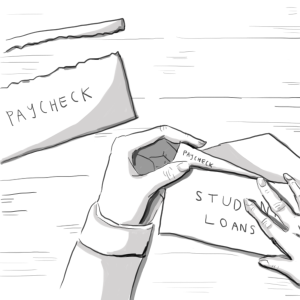We need free college, not more financial aid
Early last year, Stanford University proudly announced the latest installment in a series of progressive tuition waivers. Following the lead of fellow elite universities, such as Princeton University and Harvard University, Stanford promised free tuition for families who earn less than $125,000 per year and have less than $300,000 in assets.
Even though tuition waivers such as the one implemented at Stanford represent a progressive stepping stone toward academic equality, efforts to address college affordability cannot stop at providing financial compensation. Waiving tuition for a select few neglects the countless other ambitious students who aspire to enter elite universities, yet simply lack the resources to do so. The most effective way to tackle pervasive educational inequity is to provide free college education to the hardworking students who not only need it, but also unequivocally deserve it. Such a solution eliminates the emphasis on tuition waivers, expanding our public school network. The facade of scholarships and financial aid mask the vexing bias toward high-income students, obscuring the underlying need for free public higher education.
Though the notion of free college tuition may make some conservatives want to jump off of the fiscal cliff, this policy is more feasible than it may seem. The fallacy that many view as the solution of inequity is bolstering financial aid. Yet, augmenting the amount of financial aid simply creates new divisions. Students coming from families with very low income levels may sometimes receive sufficient aid, yet others often receive an insufficient stipend that forces them to spend much of their time working to earn money. On the other hand, due to the allocation of funds toward lower-income families, middle-class families, who may not be able to pay for college, must make due with often-insufficient financial aid.
Financial aid is removing education from higher education, placing a larger burden on working to pay for college rather than seeking knowledge. When students cannot afford tuition even after financial aid, they must sometimes enter the dark pit of high-interest student loans. In order to fully pay tuition, students continuously take out loans, lowering their credit scores. The coup de grâce of this financial aid trap is that poor credit can lead to low job prospects, continuing a vicious cycle that the dedicated low-income scholar should never justly be trapped in.
In order to minimize the academic dichotomy and create a more equal and productive society, our nation must update our archaic public education system, expanding it to adopt free higher education. In previous decades, a high school degree could result in stable industrial jobs. These industrial jobs are now dwindling, comprising only 10 percent of total employment, versus 25 percent of employment in 1970. Due to the greater need for a college degree, public education must be expanded to meet the needs of an ever-growing economy, in order to keep the United States a global leader in productivity.
The good news for those who are likely screaming bloody murder at the notion of tuition-free college, higher taxes are not the answer. The solution is not even to “feel the Bern” by adopting Democratic presidential candidate Bernie Sanders’ plan of implementing legislation that would heavily tax Wall Street. In fact, the federal government already has the funds to establish free higher education. The estimated aggregate tuition paid by both undergraduates and graduates at public four-year colleges and community colleges amounted to about $60 billion in 2012. Keeping this figure in mind, the federal government allocated roughly $77 billion in federal non-loan education revenue, such as tax breaks and grants. Reallocating the funds allocated for tax breaks and grants toward free public higher education could finally eliminate some of the greatest educational problems our country faces today.
The attendance at public institutions would likely skyrocket as a result of newfound free tuition, skewing the aforementioned numbers and admittedly making free tuition less feasible. However, there is another source of governmental cost that could be eliminated, making the possibility of free public education attainable in years to come. The federal government spends an estimated $104 billion in subsidizing student loans. Government spending to make college affordable, in fact, seems to be doing the opposite. By allocating this capital toward free tuition, students would be relieved of the financial burden of loans, and such measures would help terminate the plague of joblessness due to poor credit at the hands of insurmountable debt.
Free education, despite its feasibility, is an undeniably progressive leap from the current public education system. Public pressure is the catalyst needed to spark public education reform, in order to finally provide each American citizen with the college education he or she truly deserves. Only then can college education be seen as a right to all who seek to attain it, rather than a privilege reserved for the wealthy.


Ryan, before you graduate do yourself a favor and take Econ 101. There is no such thing as a FREE anything, whether it be tuition, housing, food, etc. An educated person living in America must understand that for someone to get something “free,” someone else is paying for it. Your notion that the federal government already has the funds to establish free higher education is faulty. Assuming there is a stockpile of cash sitting around waiting to be spent, that pile came from — you guessed it, taxpayers. Yes, you will be a taxpayer someday and will see what your take-home pay looks like after Uncle Sam and his greedy family gets a hold of money that you earned to pay for someone else’s free lunch.
If there is a dearth of white collar jobs….then what’s the hoopla about this “free college?” College isn’t for everyone, and few people who are college grads are successful.